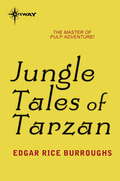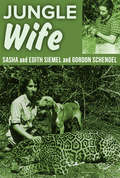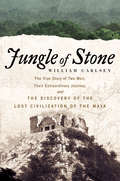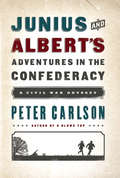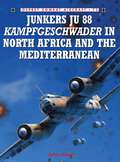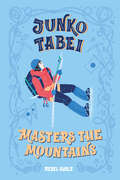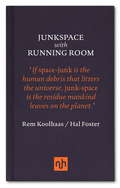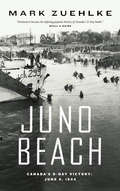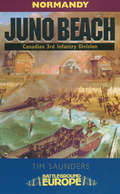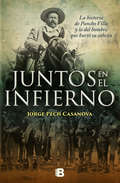- Table View
- List View
Jungle Tales of Tarzan (TARZAN)
by Edgar Rice BurroughsThe young Tarzan was unlike the great apes who were his only companions and playmates. Theirs was a simple, savage life, filled with little but killing or being killed. But Tarzan had all of a normal boy's desire to learn. He had painfully taught himself to read from books left by his dead father. Now he sought to apply this book knowledge to the world around him. He sought for such things as the source of dreams and the whereabouts of God. And he searched for the love and affection that every human being needs. But he was alone in his struggles to grow and understand. The life of the jungle had no room for abstractions.
Jungle Wife
by Sasha SiemelJungle Wife, first published in 1949, is the warm-hearted story of a Philadelphia woman who married a professional hunter and sportsman, Sasha Siemel (1890-1970) and raised a family in the wilds of the Brazilian state Mato Grosso. Sasha met his future wife, Edith Bray Siemel (1919-2012), in Philadelphia while on a lecture tour, and moved together to Brazil where they raised their three young children. The family's many adventures are described in the book. Later, the couple returned to the U.S. and settled on a farm in southeastern Pennsylvania. Included are 2 maps and 8 pages of photographs.
Jungle of Stone: The True Story of Two Men, Their Extraordinary Journey, and the Discovery of the Lost Civilization of the Maya
by William Carlsen"Thrilling. ...A captivating history of two men who dramatically changed their contemporaries' view of the past." -- Kirkus (starred review)In 1839 rumors of extraordinary yet baffling stone ruins buried within the unmapped jungles of Central America reached two of the world's most intrepid travelers. Seized by the reports, American diplomat John Lloyd Stephens and British artist Frederick Catherwood--each already celebrated for their adventures in Egypt, the Holy Land, Greece, and Rome--sailed together out of New York Harbor on an expedition into the forbidding rainforests of present-day Honduras, Guatemala, and Mexico. What they found would re-write the West's understanding of human history.In the tradition of Lost City of Z and In the Kingdom of Ice, former San Francisco Chronicle journalist and Pulitzer Prize finalist William Carlsen reveals the unforgettable true story of the discovery of the ancient Maya. Enduring disease, war, and the torments of nature and terrain, Stephens and Catherwood meticulously uncovered and documented the remains of an astonishing civilization that had flourished in the Americas at the same time as classic Greece and Rome--and had been its rival in art, architecture, and power. Their remarkable book about the experience, written by Stephens and illustrated by Catherwood, became a sensation, hailed by Edgar Allen Poe as "perhaps the most interesting book of travel ever published" and recognized today as the birth of American archeology. Most importantly, Stephens and Catherwood were the first to grasp the significance of the Maya remains, recognizing that their antiquity and sophistication overturned the West's assumptions about the development of civilization.By the time of the flowering of classical Greece (400 B.C.), the Maya were already constructing pyramids and temples around central plazas. Within a few hundred years the structures took on a monumental scale that required millions of man-hours of labor, technical and organizational expertise. Over the next millennium dozens of city-states evolved, each governed by powerful lords, some with populations larger than any city in Europe at the time, and connected by road-like causeways of crushed stone. The Maya developed a cohesive, unified cosmology, an array of common gods, a creation story, and a shared artistic and architectural vision. They created dazzling stucco and stone monuments and bas reliefs, sculpting figures and hieroglyphs with refined artistic skill. At their peak, an estimated ten million people occupied the Maya's heartland on the Yucatan Peninsula, a region where only half a million now live. And yet, by the time the Spanish reached the "New World," the classic-era Maya had all but disappeared; they would remain a mystery for the next three hundred years.Today, the tables are turned: the Maya are justly famous, if sometimes misunderstood, while Stephens and Catherwood have been all but forgotten. Based on Carlsen's rigorous research and his own 2,500-mile journey throughout the Yucatan and Central America, Jungle of Stone is equally a thrilling adventure narrative and a revelatory work of history that corrects our understanding of the Maya and the two remarkable men who set out in 1839 to find them.
Jungle: How Tropical Forests Shaped the World—and Us
by Patrick Roberts"A bold, ambitious and truly wonderful history of the world"—Peter Wohlleben, author of The Hidden Life of TreesFrom the age of dinosaurs to the first human cities, a groundbreaking new history of the planet that tropical forests made. To many of us, tropical forests are the domain of movies and novels. These dense, primordial wildernesses are beautiful to picture, but irrelevant to our lives. Jungle tells a different story. Archaeologist Patrick Roberts argues that tropical forests have shaped nearly every aspect of life on earth. They made the planet habitable, enabled the rise of dinosaurs and mammals, and spread flowering plants around the globe. New evidence also shows that humans evolved in jungles, developing agriculture and infrastructure unlike anything found elsewhere. Humanity&’s fate is tied to the fate of tropical forests, and by understanding how earlier societies managed these habitats, we can learn to live more sustainably and equitably today. Blending cutting-edge research and incisive social commentary, Jungle is a bold new vision of who we are and where we come from.
Jungleland: A Mysterious Lost City, a WWII Spy, and a True Story of Deadly Adventure
by Christopher S. Stewart“A bold attempt to solve the mystery of the White City of Honduras. . . . Readers who loved The Lost City of Z have found their next great true adventure.” —Mitchell Zuckoff, New York Times–bestselling author of Lost in Shangri-LaOn April 6, 1940, explorer and future World War II spy Theodore Morde—who would one day attempt to assassinate Adolf Hitler—was anxious about the perilous journey that lay ahead of him. Deep inside “the little Amazon,” the jungles of Honduras’s Mosquito Coast—one of the largest, wildest, and most impenetrable stretches of tropical land in the world—lies the fabled city of Ciudad Blanca: the White City. For centuries, it has lured explorers, including Spanish conquistador Herman Cortes. Some intrepid souls got lost within its dense canopy; some disappeared. Others never made it out alive. Then, in 1939, Theodore Morde claimed that he had located this El Dorado-like city. Yet before he revealed its location, Morde died under strange circumstances, giving credence to those who believe that the spirits of the Ciudad Blanca killed him.In Jungleland, journalist Christopher S. Stewart seeks to retrace Morde’s steps and answer the questions his death left hanging. Is this lost city real or only a tantalizing myth? What secrets does the jungle hold? What continues to draw explorers into the unknown jungleland at such terrific risk? In this absorbing true-life thriller, Stewart sets out to find answers—in a white-knuckle adventure that combines Morde’s wild, enigmatic tale with his own epic journey to discover the truth about the White City.“A gritty, remarkable tale of exploration and risk in a nervy trek to the edge of civilization.” —Publishers Weekly (starred review)“Stewart is a crisp, lean, colorful stylist, with that essential knack: a nose for punchy, telling anecdotes and images . . . great fun to read.” —Salon“A fascinating and gripping account, a true-to-life Indiana Jones adventure.” —Douglas Preston, New York Times–bestselling author of The Lost City of the Monkey God
Jungvolk: The Story of a Boy Defending Hitler's Third Reich
by Wilhelm Gehlen Don Gregory&“An extraordinary account of a young boy caught up in the middle of a war . . . frank and even funny at times . . . utterly absorbing&” (Books Monthly). This is the wartime memoir of a boy named Will, who happened to be the nephew of the head of Nazi Germany&’s intelligence agency. The author, only ten years old when the war began, became a helper at the local Luftwaffe flak battery, fetching ammunition. It was exciting work for Will, a member of the &“Jungvolk,&” and by the end of the war, he had become expert at judging attacks. As fighter raids increased in frequency, he noted that the pilots became less skilled. Gehlen&’s town was repeatedly bombed, and he often had to help with the wreckage or to pull survivors from basements. He witnessed more death than a child ever should; nevertheless, his flak battery continued firing until US tanks were almost on top of the position. In this book, Gehlen provides an intimate glimpse of the chaos, horror, and black humor of life just behind the front lines. As seen through the eyes of a child who was expert in aircraft identification and bomb weights, food-rationing and tank types, one encounters a view of life inside Hitler&’s wartime Reich that is both fascinating and rare. &“Although the memories Gehlen shares are narrow, and offer little insight into the Reich itself, they&’re remarkable for the child&’s perspective they bring to bear on a warring country&’s ferocious struggle.&” —Publishers Weekly &“A real gem, a quiet tour de force . . . Despite its serious subject matter the book reads as an adventure story from start to finish.&” —Military Modelling
Juniata's River Valleys
by Jeffrey AdamsThe valleys of the Juniata River occupy the very heart of the state of Pennsylvania. This ecosystem is a substantial contributor to the great Chesapeake watershed that drains a major portion of the continent. Ancient Native American pathways along the Juniata gave way to an early turnpike and soon welcomed a canal. With much fanfare, the Pennsylvania Railroad chose the Juniata Valley as the choice route to unify the state. The land that provided iron, lead, and pure silica sand at the start of the Industrial Revolution today provides hiking trails. The waterways that once hauled grain to market are now a destination for millions each year seeking relaxation and recreation. Through vintage photographs and images culled from albums and attics, Juniata's River Valleys lends a glimpse at life in earlier times along one of America's most spectacular waterways.
Junie: A Novel
by Erin Crosby EckstineGOOD MORNING AMERICA BOOK CLUB PICK • A young girl must face a life-altering decision after awakening her sister&’s ghost, navigating truths about love, friendship, and power as the Civil War looms.&“The richly textured prose quickly pulled me into [Junie&’s] treacherous yet magical world.&”—Charmaine Wilkerson, New York Times bestselling author of Black CakeSixteen years old and enslaved since she was born, Junie has spent her life on Bellereine Plantation in Alabama, cooking and cleaning alongside her family, and tending to the white master&’s daughter, Violet. Her daydreams are filled with poetry and faraway worlds, while she spends her nights secretly roaming through the forest, consumed with grief over the sudden death of her older sister, Minnie.When wealthy guests arrive from New Orleans, hinting at marriage for Violet and upending Junie&’s life, she commits a desperate act—one that rouses Minnie&’s spirit from the grave, tethered to this world unless Junie can free her. She enlists the aid of Caleb, the guests&’ coachman, and their friendship soon becomes something more. Yet as long-held truths begin to crumble, she realizes Bellereine is harboring dark and horrifying secrets that can no longer be ignored.With time ticking down, Junie begins to push against the harsh current that has controlled her entire life. As she grapples with an increasingly unfamiliar world in which she has little control, she is forced to ask herself: When we choose love and liberation, what must we leave behind?
Juniper and Anise
by Marion L CornettHulda Pearl Rosenkowski chose to survive, no matter the consequences. Poland may have been her homeland, but when murderous scavengers kill her mama and dear father, and brother Josef, during a raid on their house, she finds a way to escape. Unharmed physically but damaged forever, Hulda arrives in America with only the clothes on her back and a tattered potato bag containing a few scarce coins and precious family jewels. Dreams of becoming a "flapper" girl and brushes with members of the Detroit Purple Gang dominate Hulda's life as she counts down dwindling reserves, takes care of a broken-down farmhouse, a baby, and hides a secret that could land her in prison. Years later, as told through the eyes of small-town sheriff Claude Calkins, a story of rum-running and bootleggers stealing away in the dead-of-night with stashes of bathtub gin emerges and changes a young girl's life forever.
Junius and Albert's Adventures in the Confederacy: A Civil War Odyssey
by Peter CarlsonJunius Browne and Albert Richardson covered the Civil War for the New York Tribune until Confederates captured them as they tried to sneak past Vicksburg on a hay barge. Shuffled from one Rebel prison to another, they escaped and trekked across the snow-covered Appalachians with the help of slaves and pro-Union bushwhackers. Their amazing, long-forgotten odyssey is one of the great escape stories in American history, packed with drama, courage, horrors and heroics, plus moments of antic comedy. On their long, strange adventure, Junius and Albert encountered an astonishing variety of American charactersuAbraham Lincoln and Ulysses S. Grant, Rebel con men and Union spies, a Confederate pirate-turned-playwright, a sadistic hangman nicknamed othe Anti-Christ, OCO a secret society called the Heroes of America, a Union guerrilla convinced that God protected him from Confederate bullets, and a mysterious teenage girl who rode to their rescue at just the right moment. Peter Carlson, author of the critically acclaimed "K Blows Top," has, in "Junius and AlbertOCOs Adventures in the Confederacy," written a gripping story about the lifesaving power of friendship and a surreal voyage through the bloody battlefields, dark prisons, and cold mountains of the Civil War.
Junkers Ju 87 Stuka
by Mike GuardiaIn the opening days of Nazi Germany's Blitzkrieg campaigns, few aircraft could invoke as much terror as the Junkers Ju 87. Nicknamed the "Stuka" (an abbreviation of Sturzkampfflugzeug - the German term for "dive-bomber"), the Ju 87 was perhaps the most feared tactical bomber of the ETO. With its fixed landing gear and inverted gull wings, the Stuka was easily one of the most recognizable aircraft of the Blitzkrieg era. Although a sturdy and reliable dive-bomber, the Stuka's effectiveness was largely psychological in nature. Its dive-activated air siren produced a dreadful wail - which could incite panic in even the most disciplined of enemy ground units. However, the Stuka's effectiveness waned during the later years of the war. Lightly armored and ill-suited for air combat maneuvering, the Stuka was easy prey for Allied fighters. This title follows the Ju 87 from its development and early deployment through its operational history in the skies over Europe.
Junkers Ju 87 Stukageschwader 1937-41
by Mike Chappell John WealThe Ju 87 Stuka was the most feared weapon in the German arsenal in the first year of World War II (1939-1945), the Luftwaffe using it to deadly effect during the Blitzkrieg between September 1939 and June 1940. Although vulnerable to the enemy fighters due to its moderate speed in level flight and general lack of manoeuvrability, the Ju 87 nevertheless soon came to symbolise the might of Nazi Germany as the mere handful of Stukageschwader supporting the Wehrmacht rampaging out of the Fatherland took a heavy toll of the Allied forces.
Junkers Ju 87 Stukageschwader of the Russian Front
by John WealThis final volume of the Osprey trilogy on the infamous Luftwaffe dive-bomber charts its fortunes in the toughest theater of all: the Eastern Front. The fearsome reputation that the Stuka had enjoyed in the opening months of World War II (1939-1945) was shattered over the English Channel in the summer of 1940 but was restored in the invasion of the Soviet Union. Against a demoralized enemy, the Ju 87 scored a string of spectacular successes, destroying infantry, artillery and armor alike and sinking numerous ships of the Soviet Baltic Fleet. In the far north one Stukagruppe concentrated on bombing the Arctic port of Murmansk and disrupting rail traffic down into the Russian hinterland. However, as the Soviet Union slowly gathered strength, the Stuka units found themselves outnumbered, outfought, and relegated to operating under cover of darkness. The days of the dive-bomber were finally over. The Schlacht, or ground-attack, aircraft now ruled the skies above the battlefields.
Junkers Ju 88 Kampfgeschwader in North Africa and the Mediterranean
by John WealThis volume follows the Luftwaffe's twin-engined Wunderbomber southwards to describe its deployment in North Africa and the Mediterranean Theater during World War II (1939-1945), from the Straits of Gibraltar in the west, via the beleaguered island of Malta, to the Aegean and the Suez Canal in the east. It is a story of two distinct parts - the initial lightning successes, and then the long, slow process of retreat and defeat. It began early in 1941 with the first sporadic air raids on Malta, followed in the spring by the campaign in the Balkans which resulted in the conquests of Yugoslavia, Greece and Crete. After supporting land operations in North Africa during the latter half of 1941, the Ju 88s resumed their assault on Malta. Such was their decline, however, that by the final month of the war there was just one machine left in the Mediterranean - an improved model Ju 188, which was used to drop Axis agents behind the Allied lines in Italy. Bringing the story to life are personal accounts of some of the more famous actions - the bombing of the evacuation shipping off the coast of Greece and the sinking of three Royal Navy destroyers south of Crete by the renowned 'Helbig Flyers' of LG 1, all illustrated with rare photographs and full color profiles.
Junkers Ju 88 Kampfgeschwader on the Russian Front
by John WealCompleting Osprey's triliogy on the Ju 88 Kampfgeschwader this new volume focuses on activities on the Eastern Front during World War II (1939-1945). Comprising the main punch of the Luftwaffe's bomber arm during the initial invasion of the Soviet Union, the Ju 88 participated in a number of early strategic bomber raids on Moscow before assuming responsibility for supporting the Wehrmacht's ground forces in the field. In this role, the Ju 88s attacked bridges, road and rail communications, and troop concentrations and gave rise to many individual incidents that contribute to a varied and interesting narrative. Along with this main narrative, the book also covers the role the Ju 88s played in attacking the artic convoys that were shipping allied war supplies to Russia, and the several variant models that were employed. The strangest of these was a Ju 88 packed with explosives and guided by a fighter clipped onto its back that was used as a giant bomb against the Russians as they were approaching Berlin late in the war.
Junkers Ju 88: Blitzkrieg to the Blitz (Air War Archive)
by Chris GossDesigned as a fast bomber that could out-run the fighters of the era, the twin-engine Junkers Ju 88 became one of the most versatile aircraft of the Second World War. Such was the success of the design that its production lines operated constantly from 1936 to 1945, with more than 16,000 examples being built in dozens of variants – more than any other twin-engine German aircraft of the period. From an early stage it was intended that it would be used as a conventional light bomber and as a dive-bomber. As such, it served in the invasion of Poland, the Norway campaign, the Blitzkrieg and the invasion of France and the Battle of Britain. It went on to operate in North Africa, formed a key part of the air assault in Operation Barbarossa, and was vital to the Luftwaffes defence of Germany in the face of the Allied bomber offensive. It was also adapted for use as a fighter, night fighter, torpedo bomber, reconnaissance aircraft and even as a Mistel flying-bomb. It was used effectively against both land targets and shipping. In this selection of unrivalled images collected over many years, and now part of Frontline's new War in the Air series, the operations of this famous aircraft are portrayed and brought to life.
Junkers Ju87 Stuka (FlightCraft)
by Neil Robinson Martin DerryThe Junkers Ju 87 Stuka (a contraction of the German word Sturzkampfflugzeug, ie dive bomber) was arguably the Luftwaffes most recognizable airplane, with its inverted gull wings and fixed spatted undercarriage.Designed by Hermann Pohlmann as a dedicated dive bomber and ground-attack aircraft, the prototype first flew in 1935, and made its combat debut in 1937 with the Luftwaffe's Condor Legion during the Spanish Civil War. After several design changes in the light of operational experiences, the Stuka went on to serve the Luftwaffe and Axis forces, from the invasion of Poland in 1939, through the Battles of France and Britain in 1940, over the North African desert and the across Mediterranean, the invasion of Russia and the subsequent bitter fighting in that vast area, and following several more design changes and upgrades, continued to serve through to the end of World War Two.This latest addition to the growing Flight Craft range, follows the previous well established format, in that it is split in to three main sections. The first section, after offering a concise design and development history, continues with coverage of the various subtypes, from Anton to Gustav and their operational use from the Spanish Civil War to the end of World War Two.This is followed by a 16-page full color illustration section featuring detailed profiles and 2-views of the color schemes and markings carried by the type in Luftwaffe and Axis service. The final section lists as many of the injection-moulded plastic model kits produced of the Junkers Ju 87 in all the major scales that the authors could find details of, including the brand new Airfix 1/72 and 1/48 scale kits which were released while this book was being written, with photos of many finished models made by some of the worlds best modelers.As with all the other books in the Flight Craft range, whilst published primarily with the scale aircraft modeler in mind, it is hoped that those readers who might perhaps describe themselves as 'occasional' modelers, or even simply aviation enthusiasts, may also find that this colourful and informative work offers something to provoke their interests too.
Junko Tabei Masters the Mountains (Rebel Girls Chapter Books)
by Nancy Ohlin Rebel GirlsFrom the world of Good Night Stories for Rebel Girls comes the historical novel based on the life of Junko Tabei, the first female climber to summit Mount Everest.Junko is bad at athletics. Really bad. Other students laugh because they think she is small and weak. Then her teacher takes the class on a trip to a mountain. It's bigger than any Junko's ever seen, but she is determined to make it to the top. Ganbatte, her teacher tells her. Do your best.After that first trip, Junko becomes a mountaineer in body and spirit. She climbs snowy mountains, rocky mountains, and even faraway mountains outside of her home country of Japan. She joins clubs and befriends fellow climbers who love the mountains as much as she does. Then, Junko does something that's never been done before... she becomes the first woman to climb the tallest mountain in the world.Junko Tabei Masters the Mountains is the story of the first woman to climb Mount Everest. Even more than that, it's a story about conquering fears, personal growth, and never shying away from a challenge.This historical fiction chapter book includes additional text on Junko Tabei's lasting legacy, as well as educational activities designed to strengthen physical skills and conquer fears.About the Rebel Girls Chapter Book SeriesMeet extraordinary real-life heroines in the Good Night Stories for Rebel Girls chapter book series! Introducing stories based on the lives of extraordinary women in global history, each stunningly designed chapter book features beautiful illustrations from a female artist as well as bonus activities in the backmatter to encourage kids to explore the various fields in which each of these women thrived. The perfect gift to inspire any young reader!
Junkspace / Running Room
by Hal Foster Rem KoolhaasIn Junkspace (2001), architect Rem Koolhaas itemised in delirious detail how our cities are being overwhelmed. His celebrated jeremiad is here updated and twinned with Running Room, a fresh response from architectural critic Hal Foster. 'The manifesto is a modernist mode, one that looks to the future - Junkspace makes no such claim: Architecture disappeared in the twentieth century, states Koolhaas matter-of-factly. Junkspace does a harder thing: it foretells the present, which is to say that it calls on us to recognize what is already everywhere around us. ' Hal Foster Is there a future for architecture? If so, it might begin with the meditations - by turns elegant and frantic - of Rem Koolhaas and Hal Foster: 'even if there is no outside to Junkspace, there is still running room to be made in its cracks - ' 'Junkspace is the new flamboyant, flexible, forgettable face of architecture, rendered by Rem Koolhaas in a visceral and rampantly analytical essay. ' Office for Metropolitan Architecture
Junkyards, Gearheads, and Rust: Salvaging the Automotive Past
by David N. LucskoThe material appeal of the automobile junkyard goes beyond the search for second-hand parts.What happens to automobiles after they are retired but before they are processed as scrap? In this fascinating history, David N. Lucsko takes readers on a tour of salvage yards and wrecked or otherwise out-of-service cars in the United States from the point of view of gearheads—the hot rodders, restoration hobbyists, street rodders, and classic car devotees who reuse, repurpose, and restore junked cars.Junkyards, Gearheads, and Rust is a nuanced exploration of the business of dismantling wrecks and selling second-hand parts. It examines the reinterpretation of these cars and parts by artists as well as their restoration by enthusiasts. It also surveys the origin and evolution of gearhead-oriented yards that specialize in specific types of automobiles; dissects the material and emotional appeal of the salvage yard and its contents among enthusiasts; and examines how zoning and nuisance ordinances have affected both salvage businesses and hobbyists. Lucsko concludes with an analysis of efforts during the last twenty-five years to hasten vehicular obsolescence at the expense of salvage yards, mechanics, and enthusiasts. By examining how cars are salvaged, repurposed, and restored, this book demonstrates that the history of the automobile is much more than a running catalog of showroom novelties.
Juno Beach
by Mark ZuehlkeOn June 6, 1944 the greatest armada in history stood off Normandy and the largest amphibious invasion ever began as 107,000 men aboard 6,000 ships pressed toward the coast. Among this number were 18,000 Canadians, who were to land on a five-mile long stretch of rocky ledges fronted by a wide expanse of sand. Code named Juno Beach. Here, sheltered inside concrete bunkers and deep trenches, hundreds of German soldiers waited to strike the first assault wave with some ninety 88-millimetre guns, fifty mortars, and four hundred machineguns. A four-foot-high sea wall ran across the breadth of the beach and extending from it into the surf itself were ranks of tangled barbed wire, tank and vessel obstacles, and a maze of mines.Of the five Allied forces landing that day, they were scheduled to be the last to reach the sand. Juno was also the most exposed beach, their day's objectives eleven miles inland were farther away than any others, and the opposition awaiting them was believed greater than that facing any other force. At battle's end one out of every six Canadians in the invasion force was either dead or wounded. Yet their grip on Juno Beach was firm.
Juno Beach: Canadian 3rd Infantry Division–July 1944 (Battleground Europe)
by Tim SaundersBy June 1944, Juno Beach was a key part of Hitler's vaunted Atlantic Wall, with no less than four major strong points along its length. German pillboxes were sited to sweep the beaches with machine gun fire and were surrounded by belts of barbed wire and mines. Leading the attack were the 3rd Canadian Division, supported by the specialist assault tanks of the 79th Armoured Division (Hobart's 'Funnies'). Despite careful planning, poor D-Day weather led to a piecemeal landing and heroic individual battles in the streets of the seaside towns.
Juno's Aeneid: A Battle for Heroic Identity (Martin Classical Lectures #36)
by Joseph FarrellA major new interpretation of Vergil's epic poem as a struggle between two incompatible versions of the Homeric heroThis compelling book offers an entirely new way of understanding the Aeneid. Many scholars regard Vergil's poem as an attempt to combine Homer’s Iliad and Odyssey into a single epic. Joseph Farrell challenges this view, revealing how the Aeneid stages an epic contest to determine which kind of story it will tell—and what kind of hero Aeneas will be.Farrell shows how this contest is provoked by the transgressive goddess Juno, who challenges Vergil for the soul of his hero and poem. Her goal is to transform the poem into an Iliad of continuous Trojan persecution instead of an Odyssey of successful homecoming. Farrell discusses how ancient critics considered the flexible Odysseus the model of a good leader but censured the hero of the Iliad, the intransigent Achilles, as a bad one. He describes how the battle over which kind of leader Aeneas will prove to be continues throughout the poem, and explores how this struggle reflects in very different ways on the ethical legitimacy of Rome’s emperor, Caesar Augustus.By reframing the Aeneid in this way, Farrell demonstrates how the purpose of the poem is to confront the reader with an urgent decision between incompatible possibilities and provoke uncertainty about whether the poem is a celebration of Augustus or a melancholy reflection on the discontents of a troubled age.
Junto ao Mar
by Abdulrazak GurnahPrémio Nobel de Literatura 2021 Um romance magistral sobre exílio, memória, amor e traição, sob o pano de fundo da História e das relações tensas entre África e a Europa. Fugindo de uma paradisíaca ilha de Zanzibar em plena revolução, Saleh Omar aterra no Aeroporto de Gatwick como requerente de asilo político, afirmando não saber inglês. Consigo traz apenas uma caixa de mogno contendo o mais requintado incenso e um passaporte falso. Para comunicar com ele, os serviços sociais recorrem ao seu conterrâneo Latif Mahmud, também ele exilado em Inglaterra. Quando os dois homens se encontram numa pequena cidade junto ao mar, este último acusa o primeiro de roubar a identidade do seu pai e de ser o responsável pela ruína da sua família. Será apenas o começo de uma longa história com duas versões diferentes, que liga os seus passados turbulentos durante e após a revolução, num ajuste final de contas. Romance magistral sobre a perda e a busca de identidade em terra de exílio, Junto ao Mar é uma história sobre honra, traição e redenção, que convida o leitor a redescobrir a história da África pós-colonial e os mitos do oceano Índico que brotam da memória colectiva. «Um romance com ecos das narrativas intrincadas de As Mil e Uma Noites (...) Uma espécie de beleza.» José Mário Silva, Expresso «A dedicação de Gurnah à verdade e a sua aversão à simplificação são admiráveis.» Comité do Nobel de Literatura «Um romance envolvente, repleto de observações oportunas sobre o racismo, o imperialismo e o desconhecimento das realidades africanas.» The New York Times «Gurnah é um contador de histórias exímio.» Financial Times «Quase não ousamos respirar com medo de quebrar o encanto da leitura.» Times
Juntos en el infierno: La historia de Pancho Villa y la del hombre que hurtó su cabeza
by Jorge Pech CasanovaCrónica de infamias y canalladas cometidas por los principales protagonistas de ese infierno que fue la Revolución Mexicana. Tres veces se cruzaron los destinos de Francisco Villa y un tal Emil Holmdahl, mercenario estadounidense. La primera, cuando ambos se pusieron al servicio de la revolución maderista, Villa en las filas de Pascual Orozco, y Holmdahl en un comando extranjero. La segunda, cuando el Centauro del Norte arrasó Columbus y el ejército de los Estados Unidos rastreó su huella, sin éxito. La última, el 6 de febrero de 1926, cuando supuestamente Holmdahl profanó la tumba de Pancho Villa para sustraer su cabeza y vendérsela a una fraternidad de la Universidad de Yale. Este hecho insólito en la historia de México da pie al autor para reconstruir los episodios más relevantes de la vida de uno de los héroes más carismáticos del siglo XX.
